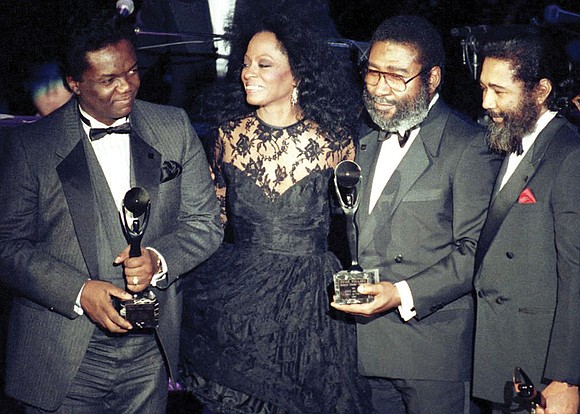Motown songwriter, producer Lamont Dozier dead at 81
Free Press wire reports | 8/11/2022, 6 p.m.

Lamont Dozier, the middle name of the celebrated Holland-Dozier-Holland team that wrote and produced “You Can’t Hurry Love,” “Heat Wave” and dozens of other hits and helped make Motown an essential record company of the 1960s and beyond, has died at age 81.
Mr. Dozier’s Monday, August 8, 2022 death was confirmed Tuesday by Paul Lambert, who helped produce the stage musical “The First Wives Club” that Holland-Dozier-Holland wrote for. Duke Fakir, the last surviving member of the original Four Tops, called Mr. Dozier a “beautiful, talented guy” with an uncanny sense of what material worked best for a given group.
“I like to call Holland-Dozier-Holland ‘tailors of music’,” Mr. Fakir said Tuesday during a telephone interview. “They could take any artist, call them into their office, talk to them, listen to them and write them a top 10 song.”
Like so many Motown artists, Mr. Dozier was born in Detroit and raised in a family of singers and musicians. He sang in the choir of his Baptist church and his love for words was affirmed by a grade school teacher who, he recalled, liked one of his poems so much she kept it on the blackboard for a month. By the late 1950s, he was a professional singer and eventually signed with Motown, where he first worked with Brian Holland, and then Eddie Holland, who wrote most of the lyrics.
Over a four-year period from 1963 to 1967, Mr. Dozier and the Holland brothers crafted more than 25 top 10 songs and mastered the blend of pop and rhythm and blues that allowed the Detroit label, and founder Berry Gordy, to defy boundaries between Black and white music and rival the Beatles on the airwaves.
The polish of Holland-Dozier-Holland was ideally suited for Motown’s signature act, Diana Ross and The Supremes, for whom they wrote 10 No. 1 songs, among them “Where Did Our Love Go,” “Stop! In the Name of Love” and “You Can’t Hurry Love.”
For the Four Tops, they wrote “Baby I Need Your Loving” and “Reach Out (I’ll Be There);” for Martha and the Vandellas they wrote “Heat Wave” and “Jimmy Mack;” for Marvin Gaye “Baby Don’t You Do It” and “How Sweet It Is (To Be Loved by You).” The music lived on through countless soundtracks, samplings and radio airings, in cover versions by the Rolling Stones, Linda Ronstadt, James Taylor and many others and in generations of songwriters and musicians influenced by the Motown sound.
Brian Wilson, Ron Wood and Mick Hucknall were among the many musicians offering tributes Tuesday. Carole King, who with then-husband Gerry Goffin was another leading hitmaker of the ’60s, posted on social media that “striving to keep up with them made us better songwriters.”
Holland-Dozier-Holland worked in various moods and styles: the casual joy of “How Sweet It Is (To Be Loved by You),” the escalating desire of “Heat Wave,” the urgency of “Reach Out (I’ll Be There).” Mr. Dozier’s focus was on melody and arrangements, whether the haunting echoes of the Vandellas’ backing vocals on “Nowhere To Run,” flashing lights of guitar that drive the Supremes’ “You Keep Me Hanging On,” or the hypnotic gospel piano on Mr. Gaye’s “Can I Get a Witness.”
Some of Motown’s biggest hits and catchiest phrases originated from Mr. Dozier’s domestic life. He remembered his grandfather’s addressing women as “Sugar pie, honey bunch,” the opening words and ongoing refrain of the Four Tops’ “I Can’t Help Myself (Sugar Pie, Honey Bunch).” The Four Tops hit “Bernadette” was inspired by all three songwriters having troubles with women named Bernadette, while an argument with another of Mr. Dozier’s girlfriends helped inspire a Supremes favorite.
“She was pretty heated up because I was quite the ladies’ man at that time and I’d been cheating on her,” Mr. Dozier told the Guardian in 2001. “So she started telling me off and swinging at me until I said, ‘Stop! In the name of love!’ And as soon as I’d said it I heard a cash register in my head and laughed. My girlfriend didn’t think it was very amusing: we broke up. The only ones who were happy about it were the Supremes.”
Mr. Dozier acknowledged that his early success conflicted with his family life, but he eventually settled down with Barbara Ullman, who died in 2021 after more than 40 years of marriage. His children include the songwriter-record producer Beau Dozier and composer Paris Ray Dozier.
The Associated Press contributed to this story.





